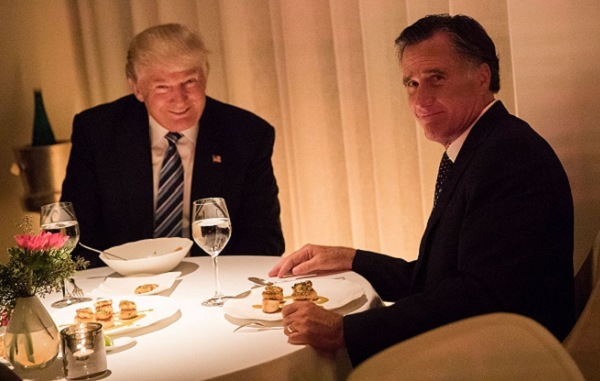.
.
.

Trump and Romney dine at Mar-a-Lago to discuss Romney’s future under Trump. Supposedly, this photo is candid, not posed.
One problem people may have with fully coming to grips with the whole Ukraine Shakedown situation is that it’s foreign. It deals with people staving off a Russian invasion — something that is no longer part of popular culture since the days of Red Dawn — and customs of a smaller country far away from us.
But that Trump’s actions (I’m being delicate there) occurred overseas is not a critical part of the story, except for the argument that Trump has complete power over foreign policy (which only applies if you think that extorting people to do a baseless investigation for personal political gain is “foreign policy.”)
They happened in Ukraine — but they could as easily have happened in Utah.
What if, in another timeline, Mitt Romney had decided to challenge Donald Trump for the 2020 Republican Presidential nomination?
Is it much of a stretch to imagine that Trump would have tried to use his power to get dirt on Romney in Utah?
One can easily imagine Trump going to Utah Attorney General Sean Reyes and telling him that he was going to do something great for Utah — maybe nice for Reyes himself, who was a finalist for Trump’s appointment to run the FTC — but that he wanted a little favor.
He would want Reyes to announce that he was opening an investigation into charges (which could elsewhere be made up, if need be, or could be plucked from this list compiled by Politifact) into Mitt Romney’s past record running Bain Capital. This wasn’t a quid pro quo, Trump would explain, because Reyes should want to investigate Romney on his own volition.
If Reyes, perhaps doubting the legitimacy of these charges (or his own jurisdiction over them) balked, Trump could escalate, telling Reyes that he should want the President to be his friend given the possibility of federal charges against him in connection with his involvement (mostly as a recipient of political contributions) from a polygamist sect accused of “defraud[ing] American taxpayers out of $511 million of renewable energy tax credits,” which he had falsely stated that he had sequestered until the end of the federal investigation.
We can imagine that at that point Reyes gave in and agreed that he would announce his own investigation of Romney in January 2020 — but that when a whistleblower from his office got wind of this and cried foul, the plan was abandoned and Trump denied ever asking him to do such an investigation, later saying that he had only said that Reyes should WANT to do it on his own.
Despite evidence of the above facts, in this alternative timeline, Reyes says (not under oath) that he never felt coerced or pressured by Trump to investigate Romney or announce plans to do it, on the grounds that “he’d never do something like that anyway.”
Is all of this OK? Or is any of it grounds for impeachment?
How about if we switch to Florida — and imagine that Trump was sequestering badly needed hurricane relief from that state unless he could get its government to investigate some spurious charge made up against Jeb Bush — who in yet another different timeline was running against him in their primary.
Would that have been OK?
If not, then why is Trump excused for his actions regarding Ukraine?
*Our Wonderful Republican Party of 1980 has officially died in 2020! Let’s just say we have had some just terrible Presidents in United States History. Just the thought of a Gerald Ford, Richard Nixon, LBJ, Jimmy Carter or Bill Clinton…..kind of makes you cringe until you think of Warren G. Harding and a host of totally sick folks like Andrew Jackson that sent all the Cherokee’s on their Trail of Tears. Ah, but today….we have reached an epoch of total nonsense. The Republican Party of old…long gone folks. Remember how they used to be the party of Fiscal Responsibility? Remember how they always wanted a Balanced Budget? Remember how they wanted to make our Environment was protected? Remember that controlling Military Expenditures and making sure that their was little or no waste and corruption were important? Days long gone citizens. Benghazi? Did anyone watch the Docudrama “13 Hours”? Probably not. What about protecting Religious Freedoms? All of them? What about protecting Freedom of the Press? All of them? What about protecting our personal information and private lives? Gone! We will remain RINO’s…..however, just on the off hand chance that the five people we like in the Republican party will do the right thing! If not, it doesn’t matter. Party Designations “mean nothing”! What did Spike Lee say: “Do the right thing!”? Thanks Dr. D., for the thought provoking article.